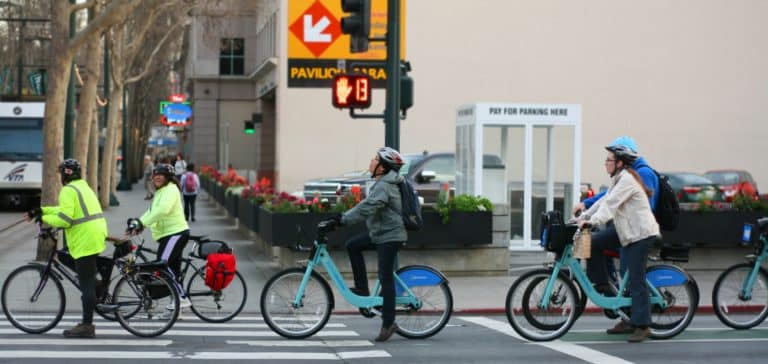
Image by Richard Masoner/Flickr, Attribution-ShareAlike.
Less “Mine!” More Time
My 20-month-old daughter, Maya, is sitting on a sheet thrown down in the grass of our friends’ backyard, painstakingly removing address labels from a sheet and pressing them onto her jeaned knee. Her little face is scrunched in concentration.
Next to her is our friend’s son, Huck, a little bit older and a whole lot blonder. He grabs for Maya’s fire truck, an object which she had zero interest in just moments earlier, but has now, predictably, decided is her favorite toy on Planet Earth. She screams, “Mine!” Most other words, at this point, come out of her mouth as garbled approximations, but this one is pronounced perfectly.
“No, mine!” replies Huck, not to be out-selfished by his younger buddy.
The irony is that Huck’s mom is one of the world’s foremost experts on the so-called sharing economy. Natalie Foster is a fellow at the Institute for the Future (based in Palo Alto, California), where she is reimagining the social safety net for the 21st century. She was also the CEO and co-founder of Rebuild the Dream, a platform for people–driven economic change, and Peers, a member-driven organization to support the sharing economy movement.
Like her son, she’s got a head of tight, blonde curls. Unlike her son, and my daughter, she’s deeply invested in an economic future where we loosen our grip on our own stuff. “The possibilities for abundance when we turn to each other for what we need are endless,” Natalie explains.
In some ways, the “sharing economy” is a fancy — not to mention, controversial — term for a very ordinary practice — offering your neighbors and friends a shovel or a shirt when you’re not using it. What’s changing, and this is not to be underestimated, is who people are willing to share with and how that sharing is actually taking place.

Whereas it wasn’t uncommon, in decades past, for people to invite friends or even friends of friends to crash when passing through town, Airbnb and Couchsurfing have made it possible for people to extend that same courtesy to perfect strangers (and, in the case of Airbnb, make some money in the process). In 2014, Airbnb’s website surpassed 800,000 listings worldwide, which means they now offer more lodging than any other hotel chain in the world.
So that basic instinct, very much on display in the wild kingdom of toddlers, to accumulate and horde our stuff is being rewritten by a new economic era. Super-powered by the Internet, we are sharing more and trusting a wider network of people (though, likely still not wide enough, evidenced by a study that shows that people bring all of their biases with them onto a site like Airbnb). Eighty million people in America have shared something — from car to a pet cat! — online. And we’re actually buying slightly less stuff, too.
It’s easy to read the typical wide-eyed business journalism treatment of all of this and chalk it up to an overhyped niche; surely it’s mostly just coastal hipsters and 25-year-olds that are benefiting from the sharing economy. Think again: according to Nielsen, more than two-thirds of people want to share or rent out personal assets for financial gain. Natalie, who is, herself, from rural Kansas originally, explains: “When the AARP had George Takei do a primer on the sharing economy, I knew we were on to something!”
We’re buying less stuff, in part, because we have less money. Consumer spending hasn’t returned since pre-recession rates in many categories.
But there’s also a growing exasperation with how owning things, especially things we don’t need, affects our quality of life. The stuff-effort equation just doesn’t add up. We have to work harder, longer, to afford more stuff, and then spend time finding that stuff we’ve worked so hard to afford. The less durable the stuff, the faster we have to run on the wheel of earning and spending, accumulating and purging. It turns out that stuff requires maintenance and maintenance requires time, and our time is one of our most precious resources. If we don’t do the maintenance, we trash our stuff, which is rapidly killing our other most precious resource: the environment.
Our increasingly urban and dense, more compact homes and apartments don’t accommodate a lot of stuff. We feel crowded out, overwhelmed, disenchanted. We can’t hear ourselves think amid all the stuff we thought would make us cooler, cuter, more efficient. We are noticing the shine of stuff wears off quickly, whereas the transformation wrought by experiences often sticks. And we are disentangling the relationship between our stuff and our identities. Status symbols just aren’t as satisfying when you’ve sobered up about the dizzying side effects of owning a lot of stuff. That temporary booster of esteem peters out and, in its place, there’s an accumulation hangover.
The American dream was never meant to be locked away in the 51,000 personal storage facilities in the U.S., just as that fire truck that is technically Maya’s does no one any good if it’s tucked into a toy chest, safe from other grubby little paws but inert, unused, unloved. Turns out, we’re all growing up a little.



Share your reflection